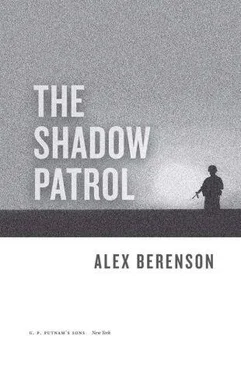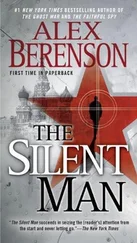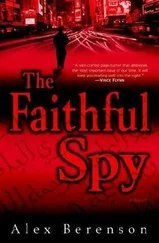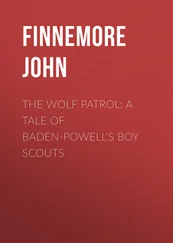Alex Berenson - The Shadow Patrol
Здесь есть возможность читать онлайн «Alex Berenson - The Shadow Patrol» весь текст электронной книги совершенно бесплатно (целиком полную версию без сокращений). В некоторых случаях можно слушать аудио, скачать через торрент в формате fb2 и присутствует краткое содержание. Жанр: Шпионский детектив, на английском языке. Описание произведения, (предисловие) а так же отзывы посетителей доступны на портале библиотеки ЛибКат.
- Название:The Shadow Patrol
- Автор:
- Жанр:
- Год:неизвестен
- ISBN:нет данных
- Рейтинг книги:3 / 5. Голосов: 1
-
Избранное:Добавить в избранное
- Отзывы:
-
Ваша оценка:
- 60
- 1
- 2
- 3
- 4
- 5
The Shadow Patrol: краткое содержание, описание и аннотация
Предлагаем к чтению аннотацию, описание, краткое содержание или предисловие (зависит от того, что написал сам автор книги «The Shadow Patrol»). Если вы не нашли необходимую информацию о книге — напишите в комментариях, мы постараемся отыскать её.
The Shadow Patrol — читать онлайн бесплатно полную книгу (весь текст) целиком
Ниже представлен текст книги, разбитый по страницам. Система сохранения места последней прочитанной страницы, позволяет с удобством читать онлайн бесплатно книгу «The Shadow Patrol», без необходимости каждый раз заново искать на чём Вы остановились. Поставьте закладку, и сможете в любой момент перейти на страницу, на которой закончили чтение.
Интервал:
Закладка:
Alex Berenson
The Shadow Patrol
To all the men and women still fighting
Disappointment must be dealt with. You must wander in paradise just once more before you decide not to take the stuff again. A trifle more.
— A Coffin for Dimitrios, Eric AmblerCertainly there is no hunting like the hunting of man and those who have hunted armed men long enough and liked it, never really care for anything else thereafter.
— “On the Blue Water: A Gulf Stream Letter,” Ernest Hemingway , Esquire, April 1936PROLOGUE
Marburg.
The trigger for everything.
What really happened.
The cab, a battered blue Nissan, pulled over a hundred meters from the front gate of the headquarters of Jordan’s General Intelligence Directorate — the mukhabarat . The passenger handed over twenty Jordanian dinars and stepped out without waiting for change. He brushed imaginary dust from his tailored blue suit as the Nissan pulled away. The cars and trucks speeding by didn’t bother him. He was a light-skinned Arab, dapper and slim. He wore a thick gold bracelet on his right wrist, a steel Rolex on his left.
The gate guards were more puzzled than alarmed at his approach. His suit fit too well to hide a suicide vest. He didn’t look dangerous. But most Jordanians were wise enough to give the muk a wide berth. Especially ones dressed like him. Before he reached the gatehouse, two guards emerged, AKs at the ready. They put him on his knees and pulled a hood over his head and dragged him inside to explain himself.
His name was Dr. Ahmad Rashid. He was a cardiologist at a hospital in eastern Amman. And — as he told the muk and then the CIA — he wanted to go to Pakistan’s North-West Frontier, infiltrate al-Qaeda, and destroy it. He blamed al-Qaeda for the death of his brother, Farhad, who had killed himself a year earlier in a suicide bombing in Baghdad.
“This very day, one year ago. Twenty-two years old, but he could hardly read or write. If he went a few streets from our house, he was lost. A child. They filled his head with angels and virgins.”
Rashid’s potential was obvious. For nearly a decade, the CIA had sought reliable sources inside al-Qaeda, men who might narrow the search for Osama bin Laden and his deputy, Ayman al-Zawahiri. Eventually, of course, the agency and NSA would track bin Laden to a compound less than fifty miles from the Pakistani capital of Islamabad. SEAL Team Six would do the rest. But in 2009, bin Laden was still a ghost. The agency had no hard information on him. Rashid could fill the gap.
Assuming he was genuine, of course. Brad Stanley, the station chief at Amman, feared that Rashid might be a con man, or — worse — a double agent sent by al-Qaeda. But his story held up under scrutiny from Amman station and the muk . The Jordanians reported that Rashid belonged to a moderate mosque and wasn’t on their watch lists. Amman school records showed that his brother had dropped out in sixth grade. Army files confirmed a suicide bombing in Baghdad by a Jordanian, first name Farhad, last name unknown, on June 16, 2008.
With those preliminaries out of the way, Stanley decided that Rashid was worthy of surveillance. He put a four-man team on Rashid, led by Todd Laitz, his best watcher, maybe the best in the Middle East. For two weeks, Laitz and his men tracked Rashid. He jogged every morning at a gym in downtown Amman. He stayed late at the hospital most nights. He visited his mosque only for the Friday midday prayer, which was more or less obligatory. Laitz summed him up to Stanley in four politically incorrect words: “Even whiter than you.”
“Doubtful.” Stanley had played lacrosse at the University of Maryland, which made him practically albino. “What do you think?”
“I think there’s plenty of upside and we can limit the downside. I’d do it.”
Stanley agreed. So did the bosses in the Counterterrorist Center back at Langley. On July 16, the DO — as everyone still called the unit now officially known as the National Clandestine Service — approved Rashid’s recruitment. The CIA gave him the code name Marburg, after an African virus that caused its victims to bleed to death. The agency hoped that Rashid would do the same to al-Qaeda.
Running Rashid from Amman didn’t make sense. He was handed off to Marci Holm, a senior case officer in Kabul. Making Rashid report to a female operative offered another test for him. The agency believed that a genuine jihadi wouldn’t want to take orders from a woman. Plus Holm was a rising star, a tall, angular woman who had managed a half dozen successful ops in Afghanistan.
Rashid didn’t complain when he was told Holm would be his controller. Their first meeting came in late August, in Dubai. They walked the giant Mall of the Emirates as Holm gave Rashid a three-hour crash course on tradecraft. No dead drops or chalk marks, just e-mail addresses and keywords. Cricket to schedule a meeting, pulse if he believed he’d been discovered.
“You shouldn’t have trouble getting in and out,” she said. They were speaking English. Holm’s Arabic was good. Rashid’s English was better. “They won’t want to keep you in the mountains. They don’t have many men who can travel as freely as you.”
“Maybe they’ll want me to take care of them.”
“Even then they’ll let you leave to get the drugs you need to treat them. As long as they trust you, it won’t be a problem. And your brother martyred himself for them.”
“Animals.”
“They’re not stupid. You need to be cautious. No unnecessary risks. I don’t have to tell you what happens if they question your loyalty.”
“I understand.”
“But yes, we think they’ll accept you. We think it’s possible that within a few months you could meet their top men.”
“Bin Laden.” Rashid whispered the name.
“As far as we can tell, only a few people ever see him. Al-Zawahiri’s more likely. You understand, he sets the strategy. He’s the one who decides to use boys like Farhad as martyrs.”
“I know you don’t trust me,” Rashid said, apropos of nothing.
“If I didn’t trust you, I wouldn’t be here.”
“It’s all right. I’ll prove myself to you.”
They’d walked the mall twice, end to end, Rashid’s loafers clacking on the polished floors. Along the way they’d stopped at a Polo store, where he tried on a salmon-colored long-sleeved shirt. “Do you like it?”
“It’s very nice.” He’s not a terrorist, Holm thought. Can’t be. Terrorists don’t wear pink Polo shirts.
Now they had looped back to the mall’s signature attraction, its indoor ski hill, an almost criminal waste of energy, considering that the temperature outside was 101 degrees. But Dubai — like Las Vegas, its American twin — pretended to exist outside the laws of nature. Dubai created wants, and then satisfied them at a tidy profit. Put skiing in the desert, and people who’d never seen snow would buy twelve-hundred-dollar Prada jackets to skid down a two-hundred-foot hill. Yet Holm had to admit she enjoyed visiting the place, its glass-and-steel towers so unlike Kabul’s shattered blocks. She’d take endless consumerism over endless war.
Rashid watched the skiers. “Shall we try it?” As if they were on a date. His manners matched his clothes. He was old-fashioned, almost courtly.
“Not me.” She’d grown up in Oregon, snowboarding at Mount Hood. She wasn’t renting a parka for this foolishness. “But you should. Have you ever skied before?”
Читать дальшеИнтервал:
Закладка:
Похожие книги на «The Shadow Patrol»
Представляем Вашему вниманию похожие книги на «The Shadow Patrol» списком для выбора. Мы отобрали схожую по названию и смыслу литературу в надежде предоставить читателям больше вариантов отыскать новые, интересные, ещё непрочитанные произведения.
Обсуждение, отзывы о книге «The Shadow Patrol» и просто собственные мнения читателей. Оставьте ваши комментарии, напишите, что Вы думаете о произведении, его смысле или главных героях. Укажите что конкретно понравилось, а что нет, и почему Вы так считаете.

![Brian Jacques - [Redwall 10] - The Long Patrol](/books/128376/brian-jacques-redwall-10-the-long-patrol-thumb.webp)










